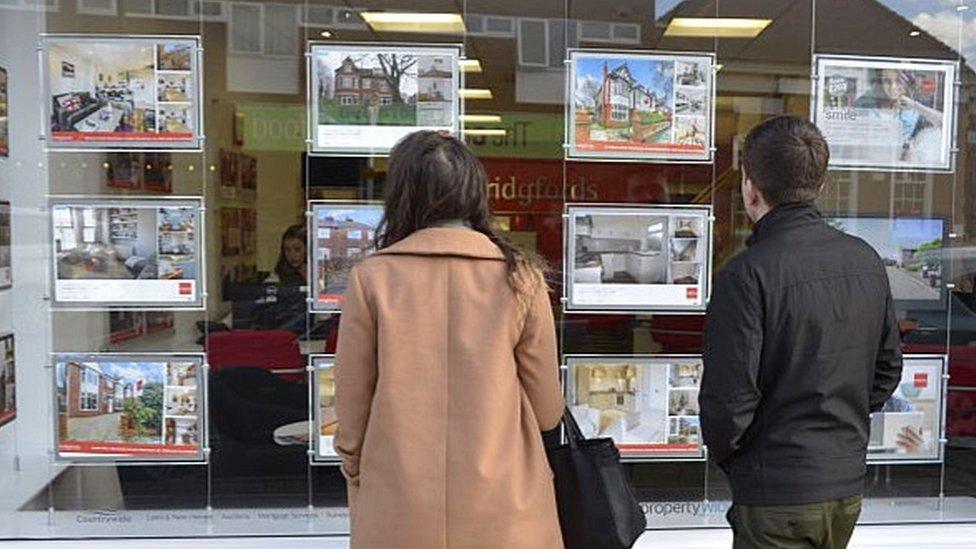Pricing in uncertainty as energy bills rise
- Published

We've rarely, if ever, had such advance warning of an price inflation shock, and we know another one will also come to household energy bills in September, with a new forecast that it will mean household energy bills doubling in one year and two tranches.
Inflation is ruthlessly invasive when it takes hold, and global economic pressures allied to war in Ukraine make its future path and impact highly uncertain.
Growth forecasts for Scotland have been sharply downgraded, as some firms cut back output in response to energy price hikes, while struggling to secure supplies and skilled labour.
Price inflation is usually more stealthy. It creeps in, and once established, it's hard to dislodge.
It can be ruthless, having the harshest effect on those with least power to increase income to compensate - fixed income pensioners prominent among them.
It erodes savings and confidence for investment. The Institute of Directors mark the start of April with an update from the nation's boardrooms, showing a very sharp decline in investment confidence.
Price inflation also rips through companies that fail to hedge against it, such as the 28 energy supply companies that collapsed since September.
It can spiral, and those of us who remember the 1970s will recall that it can invade the political realm and infect it to its roots.
Hotting up
Today marks a surge in price inflation that, unusually, we've seen coming for at least four months. The actual figure for the rise in price cap on domestic energy bills - at 54% - was announced nearly two months ago.
Wholesale gas and electricity prices were surging long before the Ukraine war actually began.
They were in response to rising tensions on the Russian border with Ukraine, yes, but also to rising global demand coming out of the pandemic, and some sticky supply issues.
While there may be hopes of a ceasefire in Ukraine, the economic war between Russia and its energy customers - notably Germany, Poland and Austria, which have begun preparations for supply shortages - is hotting up.
The spot price for natural gas has continued at much higher levels than this time last year - very roughly five times higher, as it bounces around in response to Europe's temperature (a cold snap pushes prices up) and the latest economic sabre-rattling from the Kremlin.
Shanghai shipping
So we can expect another huge rise, announced this July and implemented at the start of October 2022, reflecting prices we can already see. Cornwall Insights consultancy has made some assumptions, and estimated average dual-fuel prices will rise by more than £600 to £2,599.
That would be a doubling of household energy bills in one year and two steps. And while they are forecast to subside thereafter, the modelling suggests they would fall to a point closer to this summer's elevated prices than last summer's.

Shanghai has gone into another lockdown
That is only one part of the story of price inflation and earnings erosion. War in Ukraine is pushing up food prices, through lowering grain sales into the world market and as Russia is a big supplier of fertiliser for future crops.
Skilled labour shortages, exacerbated by Brexit, push up wages and they can be passed on to prices.
A further lockdown in Shanghai is a reminder that even brief disruptions to shipping supply chains can have prolonged and expensive effects on availability of goods.
Freezing bands
There are tax rises coming too; payroll tax from Tuesday on both employers and employees. The higher threshold announced in Rishi Sunak's Spring Statement and designed to offset the cost for below-average earners does not start until July.
VAT on hospitality returns to 20%, having been at 5% and more recently 12.5% to help the sector weather the pandemic. Similar measures on business rates are being phased out.
From today, vehicle duty is up, as is passenger departure tax. Council tax rises in most Scottish council areas by 3% and an average 3.5% in England.
And while other prices rise, one of the biggest tax increases is through freezing of thresholds, of income tax at its starter rate and for higher bands, also for capital gains and inheritance taxes.
To offset this, there are £200 energy bill loans, £150 council tax rebates and hardship grants. Improvements to home energy efficiency see VAT dropped to zero. The minimum wage and national living wages go up.
Distorting effects
From 11 April, so do welfare benefits and pensions, but only by 3.1% - they are set each year at the inflation rate in the preceding September, and the chancellor claims to have lacked the capacity to alter that. A lesser range of Scottish government welfare payments get a more generous uprating of 6%.
The inflation rate for April is expected to be nearing 8%. If economic warfare intensifies, it could hit double figures. And it won't fall quickly.
The Office for Budget Responsibility expectation is of inflation averaging 7.4% across the year. And that doesn't include home prices, which continue to rise - according to Nationwide Building Society - by more than 14% for the UK, and 12% for Scotland.

Home prices are continuing to rise
That may reflect the distorting effects of inflation, pushing savers to plough their cash into property.
And from the Fraser of Allander Institute at Strathclyde University, the quarterly forecast has been sharply cut from 4.7% to 3.5% this year, and a very weak 1.5% in 2023.
That foresees a weaker recovery than the rest of the UK, and the gap growing in 2024, with weaker growth still, at 1.4% in Scotland, while the UK is on a course for 21%.
It highlights a fifth of firms responding to its surveys saying they are cutting back output due to rising energy bills, and more than half say they are struggling to get either supplies of goods and services, or the skilled labour they need.
Abundant uncertainty
This represents an almighty reset. Only some will have the leverage, after the short term, to recoup their lost spending power.
Those governments and corporates which control energy are seeing their power enhanced, and that ought to include renewables.
The exception is Russia, punished for its aggression by its energy customers and cutting itself off from the dominant western economy.
The most abundant commodity is uncertainty - about how this period is resolved, and how much damage will be done to household and company finances in the process.
Governments, by contrast, can look on the bright side of inflation - the fact that it quickly depletes their piles of debt built up through the financial crunch and pandemic.
Related topics
- Published1 April 2022


